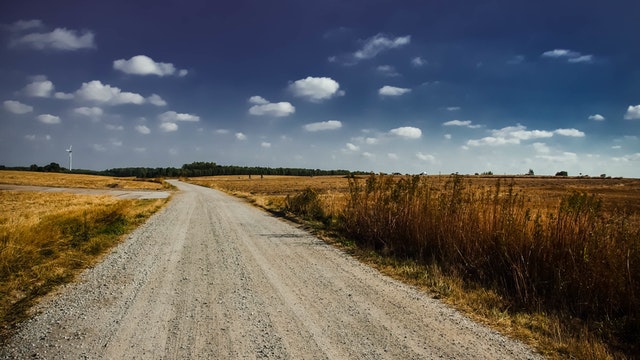
You can’t create a strong unpaved roadway surface without understanding the most granular details about the road and worksite themselves, including soil composition, traffic volume, and climate.
You can’t take care of an unpaved road without understanding that road inside and out — and your average road can be more complex than you might think. It’s not atypical for an unpaved roadway to encounter both dry and wet conditions as it winds through vineyards or between heavy construction worksites. That’s why every one of these surfaces must be studied and analyzed before they can effectively be stabilized, accounting for details like traffic volume and soil composition that can vary throughout the road.
Both less costly to construct and less disruptive to the natural features of their environment, unpaved roads are a great alternative to asphalt roadways, and can be just as strong. But in order to make that pavement-like strength a reality, you need to first consider every possible variable that might affect a road’s strength before you start to build it. Let’s dive into the details that determine how different soils will be stabilized to create a solid road surface.
Finding the Right Solution for Every Soil
When it comes to developing a durable unpaved road, the objective is ultimately to treat the in-place soil so that its California Bearing Ratio (AKA load-bearing strength) is increased by four to six times. This process is properly called soil stabilization, and begins with a series of tests that determine the soil’s chemical and molecular makeup. These tests allow technicians to decide the appropriate chemical binders to use on the roadway.
Beyond the qualities and characteristics of the earth itself, another key factor that influences which binding products are selected is the soil’s relationship to the surrounding climate. Clay-based soils, for example, absorb moisture more readily than others. This means that when it rains, roads containing clay sediments will expand; as the air dries out, they contract. This expansion and contraction damages the earth’s surface, riddling it with cracks and potholes. An effective soil stabilization program should work to combat this problem on a chemical level.
The best soil stabilization methods utilize cement and lime to treat clay sediments, as these materials fuse together to create a moisture-repellant barrier. For roads in landscapes with more granular soil like sand, however, such solutions will do little to strengthen a road. Instead, unpaved roads that stretch through desert environments need a soil stabilization solution that combines a polymer with some kind of fibrous substance.
Even across short distances, soils can vary extensively in composition. It’s not uncommon that a road will pass through soils with vastly different chemistries that in turn require vastly different stabilizing solutions. By assessing these differences, technicians can harness the natural properties of the various soils in their roads — failure to do so is likely to result in a surface in need of frequent and costly repairs as the years go by.
Not a One-Size-Fits-All Solution
With over four decades of experience, Midwest Industrial Supply, Inc. has the expert team and suite of products needed to create solutions for unpaved roadways in any environment. Our specially formulated polymer emulsions Eco-Pave® and Soil-Sement® are uniquely designed to to stabilize soil, and when combined with the right substances and materials, they can create a phenomenal CBR in any environment the roadway may pass through.
Midwest doesn’t simply offer the products, however — our team of industry veterans works with you each step of the way to ensure that your road remains strong and functional for years to come. We begin by testing the native soils along your roadway before employing our GreenPave® technology, which enhances the unique compositions of your in-place soils to stabilize the road for its intended use.
What’s more, all of Midwest’s products are designed to reduce maintenance costs by significantly boosting your road’s lifespan. And with programs that strengthen roads at shallower depths than others on the market, our solutions can save you up to 80% on the cost of comparable asphalt constructions.
At Midwest, we don’t offer a one-size-fits-all solution — we design a custom program based on your site’s specific needs to get the results you want. Get in touch today to learn more about our tailor-made solutions to your unpaved road issues.


